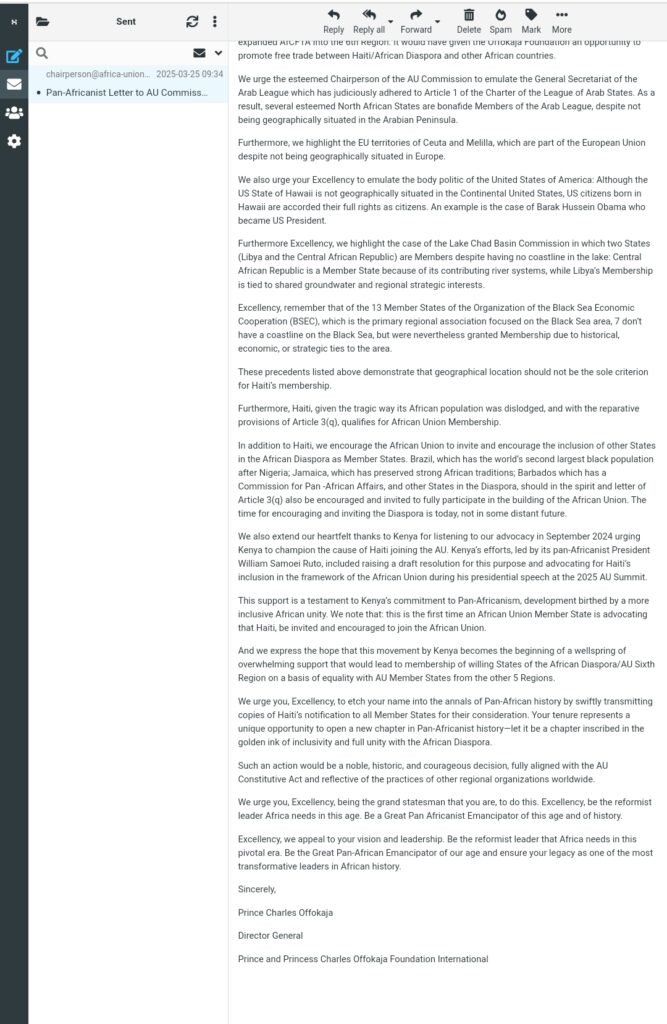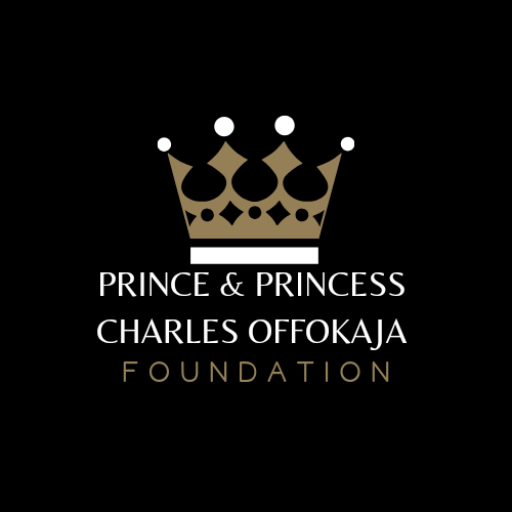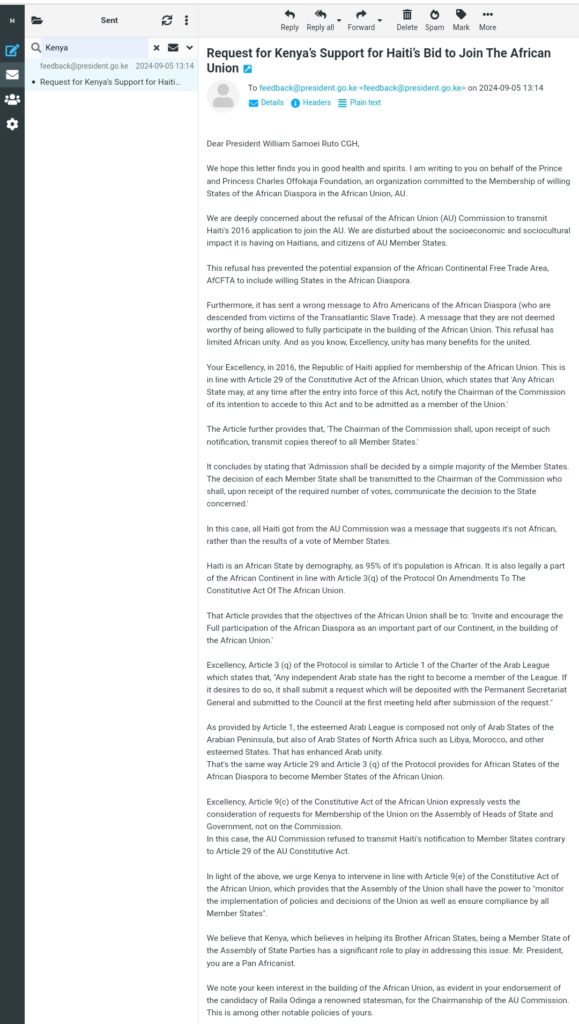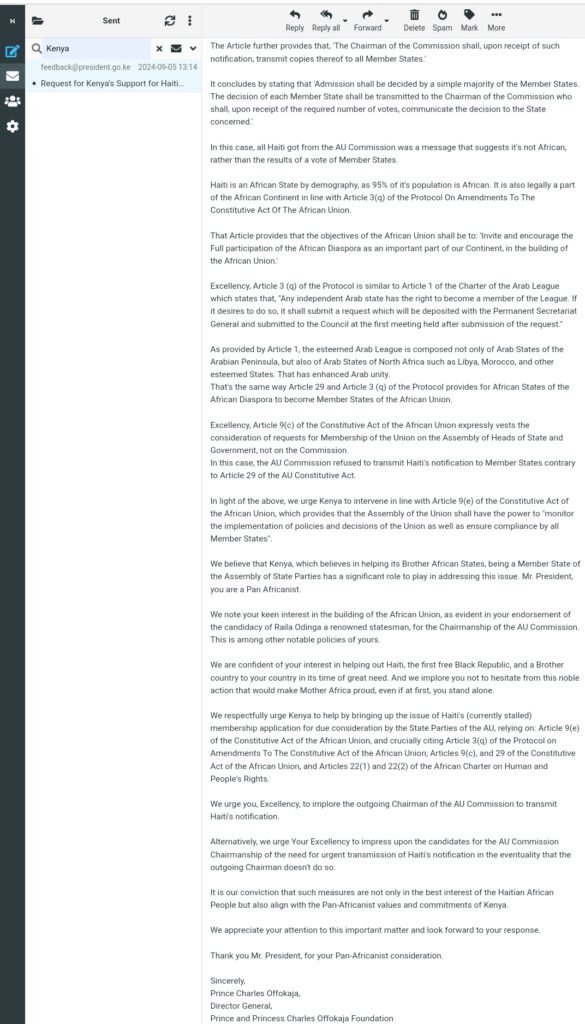The Prince and Princess Charles Offokaja Foundation International, a think-and-do tank has congratulated the new Chairperson of the African Union Commission, H.E. Mahmoud Ali Youssouf on his election victory. The Foundation has also urged him to speedily transmit Haiti’s AU membership notification for the Member States to decide on. This message was contained in a letter sent via email to the AU leader.
The message reads:
“Dear H.E. Mahmoud Ali Youssouf,
“Excellency, the Prince and Princess Charles Offokaja Foundation International—a Pan-Africanist think-and-do tank—extends its heartfelt congratulations on your recent appointment as Chairperson of the African Union (AU) Commission.
“Your dedication and leadership within the African community are highly commendable, and we eagerly anticipate a period of meaningful progress and development under your guidance.
“In 2016, Haiti, the world’s first free black republic, relying on Article 29 of the Constitutive Act of the African Union, notified the then Chairperson of the African Union (AU) Commission of its intention to be admitted as a member of the Union. According to Article 29, admissions shall be decided by a simple majority of AU Member States.
“However, the Commission, without relying on the presence or absence of a simple majority vote of AU Member States, announced that Haiti would not be admitted as an African Union Member State at the AU’s 2016 Summit because “only African countries can join the AU”.
“This suggests that Haiti, the world’s first free black republic, is not an African country and therefore isn’t qualified.
“We strongly disagree. Even if the AU Commission argued that Haiti is not geographically on the African Continent, under AU Law, it is legally in the African Continent and fully qualified. This is due to the provisions of Article 3(q) of the Protocol on the Amendments to the Constitutive Act of the African Union.
“This freeze of Haiti’s bid came despite the African connection of about 95% of Haitians whose ancestors were victims of the Transatlantic Slave Trade, and therefore needed that admission after all they’ve been through.

“If the then Chairperson of the AU Commission had transmitted Haiti’s notification, and it had been accepted by a simple majority of AU Member States, Haiti would also have been free to join the AU’s free trade area, the African Continental Free Trade Area, AfCFTA.
“This would have boosted economic prospects of Haiti and other African countries. It would have expanded AfCFTA into the 6th Region. It would have given the Offokaja Foundation an opportunity to promote free trade between Haiti/African Diaspora and other African countries.
“We urge the esteemed Chairperson of the AU Commission to emulate the General Secretariat of the Arab League which has judiciously adhered to Article 1 of the Charter of the League of Arab States. As a result, several esteemed North African States are bonafide Members of the Arab League, despite not being geographically situated in the Arabian Peninsula.
“Furthermore, we highlight the EU territories of Ceuta and Melilla, which are part of the European Union despite not being geographically situated in Europe.
“We also urge your Excellency to emulate the body politic of the United States of America: Although the US State of Hawaii is not geographically situated in the Continental United States, US citizens born in Hawaii are accorded their full rights as citizens. An example is the case of Barak Hussein Obama who became US President.
“Furthermore Excellency, we highlight the case of the Lake Chad Basin Commission in which two States (Libya and the Central African Republic) are Members despite having no coastline in the lake: Central African Republic is a Member State because of its contributing river systems, while Libya’s Membership is tied to shared groundwater and regional strategic interests.
“Excellency, remember that of the 13 Member States of the Organization of the Black Sea Economic Cooperation (BSEC), which is the primary regional association focused on the Black Sea area, 7 don’t have a coastline on the Black Sea, but were nevertheless granted Membership due to historical, economic, or strategic ties to the area.

“These precedents listed above demonstrate that geographical location should not be the sole criterion for Haiti’s membership.
“Furthermore, Haiti, given the tragic way its African population was dislodged, and with the reparative provisions of Article 3(q), qualifies for African Union Membership.
“In addition to Haiti, we encourage the African Union to invite and encourage the inclusion of other States in the African Diaspora as Member States. Brazil, which has the world’s second largest black population after Nigeria; Jamaica, which has preserved strong African traditions; Barbados which has a Commission for Pan -African Affairs, and other States in the Diaspora, should in the spirit and letter of Article 3(q) also be encouraged and invited to fully participate in the building of the African Union. The time for encouraging and inviting the Diaspora is today, not in some distant future.
“We also extend our heartfelt thanks to Kenya for listening to our advocacy in September 2024 urging Kenya to champion the cause of Haiti joining the AU. Kenya’s efforts, led by its pan-Africanist President William Samoei Ruto, included raising a draft resolution for this purpose and advocating for Haiti’s inclusion in the framework of the African Union during his presidential speech at the 2025 AU Summit.
“This support is a testament to Kenya’s commitment to Pan-Africanism, development birthed by a more inclusive African unity. We note that: this is the first time an African Union Member State is advocating that Haiti, be invited and encouraged to join the African Union.
“And we express the hope that this movement by Kenya becomes the beginning of a wellspring of overwhelming support that would lead to membership of willing States of the African Diaspora/AU Sixth Region on a basis of equality with AU Member States from the other 5 Regions.
“We urge you, Excellency, to etch your name into the annals of Pan-African history by swiftly transmitting copies of Haiti’s notification to all Member States for their consideration. Your tenure represents a unique opportunity to open a new chapter in Pan-Africanist history—let it be a chapter inscribed in the golden ink of inclusivity and full unity with the African Diaspora.
“Such an action would be a noble, historic, and courageous decision, fully aligned with the AU Constitutive Act and reflective of the practices of other regional organizations worldwide.
“We urge you, Excellency, being the grand statesman that you are, to do this. Excellency, be the reformist leader Africa needs in this age. Be a Great Pan Africanist Emancipator of this age and of history.
“Excellency, we appeal to your vision and leadership. Be the reformist leader that Africa needs in this pivotal era. Be the Great Pan-African Emancipator of our age and ensure your legacy as one of the most transformative leaders in African history.
“Sincerely,
“Prince Charles Offokaja
“Director General
“Prince and Princess Charles Offokaja Foundation International”



